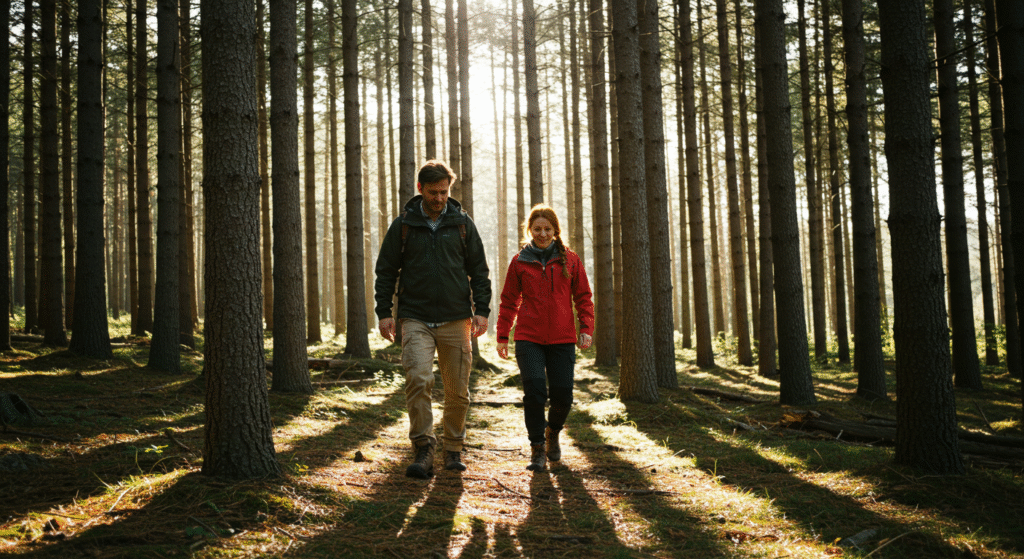What Happens to Your Body After a Week in the Wilderness and Why You Need to Know
If you’ve ever spent more than a few days immersed in nature, you know the wilderness has a way of reshaping you. From aching muscles to clearer thoughts, the changes you experience go beyond surface-level. A full week in the wild triggers physical transformations, mental shifts, and biological reactions that can leave lasting effects, both beneficial and challenging. Understanding what happens to your body and mind during this time isn’t just fascinating, it’s essential for safe, satisfying adventures.
Whether you’re planning a solo trek, a guided backcountry tour, or just wondering what extended outdoor exposure does to the human system, this guide walks you through the science and the stories behind life off the grid.

Muscles, Metabolism, and Motion
When you’re hiking through forests or climbing rocky trails day after day, your body kicks into performance mode. Consistent movement like walking, climbing, and hauling gear, builds muscle tone, especially in the legs, core, and shoulders. Your endurance improves rapidly as your cardiovascular system adapts to the increased demand.
Your metabolism also revs up, burning more calories to fuel constant activity. However, this can be a double-edged sword. Many backpackers report a noticeable calorie deficit if their food supply doesn’t match their energy output. This leads to weight loss, fatigue, and even impaired decision-making if not carefully managed.
Sleep may become elusive, especially in unfamiliar environments with variable temperatures or wildlife noises. But with exposure to natural light and absence of screens, your circadian rhythm often resets, helping your body align more closely with sunrise and sunset. This reset can improve sleep quality; even if total hours of rest are fewer.
A Clearer Mind and a Calmer Heart
Mentally, a week in the wilderness can feel like shedding layers of stress. Nature immersion has been proven to reduce cortisol, the body’s primary stress hormone. A 2019 study in Frontiers in Psychology showed that spending just 20 minutes in nature significantly lowers cortisol levels. Imagine what seven days can do.
Outdoor environments also boost mood and mental clarity. Free from digital distractions, your brain can rest and refocus. Many adventurers report increased creativity and emotional resilience after time in the wild; benefits supported by research from the University of Kansas, which found that multi-day nature exposure can enhance creative problem-solving by up to 50%.
You may even notice a shift in how you process emotions. Long walks and quiet nights provide space for introspection, making the wilderness a powerful setting for mental healing.
Powered by Pines and Fresh Air
Being outdoors doesn’t just feel good, it’s scientifically good for you. Phytoncides, the natural oils emitted by trees and plants, have been linked to improved immune function. A study published in Environmental Health and Preventive Medicine found that forest bathing increases natural killer cell activity, which helps fight infections and cancer.
Cleaner air and reduced exposure to pollutants also benefit respiratory and cardiovascular health. Even short-term escapes from urban environments give your body a break from toxins and allergens. Plus, natural sunlight helps regulate vitamin D levels, which play a key role in immune strength and mood stabilization.
Inflammation, often driven by stress and sedentary living, tends to decrease in nature-rich settings. This shift supports recovery, reduces joint pain, and promotes overall wellbeing.
The Reentry Struggle Is Real
Returning to modern life after a week in the wilderness can be surprisingly tough. Your senses, which grew attuned to rustling leaves and birdsong, suddenly face traffic noise and screen glare. This overstimulation can feel jarring and even depressing.
Physically, you might experience dehydration if you resume processed foods and caffeine-heavy routines too quickly. Your digestion may slow down, and your sleep schedule can take a hit. Emotionally, some people experience a “post-trail blues,” a temporary dip in mood as they readjust.
To ease the transition, gradually reintroduce digital exposure, maintain hydration, and stick to elements of your wilderness routine, like outdoor walks or quiet time. Reflecting on your journey through journaling or sharing stories helps reinforce positive impacts.

Expert Tips for a Healthier Trek
Preparation is everything when it comes to making the most of your time outdoors. Here’s how to prime your body and mind:
- Condition Before You Go: Start a cardio and strength routine weeks in advance.
- Prioritize Nutrition: Pack calorie-dense, whole foods that support energy and recovery.
- Dial In Your Sleep System: Test your sleep setup at home to ensure comfort and insulation.
- Stay Hydrated: Use water filters or purification tabs and track your intake.
- Prep Mentally: Practice mindfulness or journaling to acclimate to solitude.
And don’t forget safety basics: carry a first-aid kit, know your route, and let someone know your itinerary. These aren’t just precautions. They’re confidence builders.
Five Quick Facts About Wilderness Effects
- Boosted Immunity: Forest air increases natural killer cell activity.
- Calorie Burn: A hiker can burn 3,000–6,000 calories per day on the trail.
- Cortisol Drop: Just 20 minutes in nature lowers stress hormone levels.
- Creative Gains: A week outdoors can increase creativity by up to 50%.
- Sleep Reset: Natural light helps recalibrate the circadian rhythm.
Final Thoughts: Rewild Your Routine
The wilderness changes you. That’s part of its magic. But it’s also a reminder: your body and mind crave movement, quiet, and clean air more than notifications and fluorescent lights. A week in the wild reveals not only what’s possible in nature, but what’s necessary for wellness.
By understanding and respecting these changes, you can prepare more effectively, enjoy your time more fully, and integrate those benefits into everyday life. Whether you’re chasing summits or seeking stillness, the wilderness has something to teach you. Are you ready to listen?
